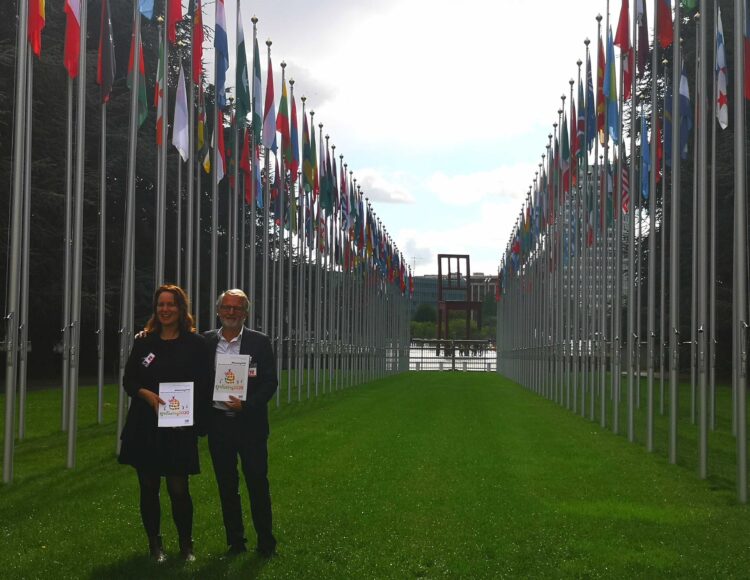The long-awaited #Housing2030 study led by Housing Europe, UNECE and UN-Habitat that looks at land policy, decarbonisation of homes, sustainable finance and better governance while ensuring housing affordability was officially launched on October, 6th during UNECE’s Ministerial Meeting on Urban Development, Housing and Land Management at the UN Headquarters in Geneva. Policymakers are not helpless against the housing crisis. This two-year research clearly shows how governance, strategic land policy, as well as purposeful circuits of investment and active promotion of climate neutral and affordable housing can move mountains.
Approximately 50 million people in the UNECE region live in inadequate housing conditions, while unaffordability and housing exclusion are also prominent issues in the region. This has led many housing experts, including the UN Special Rapporteur on the Right to Adequate Housing, to declare that our housing systems are “in crisis”.[1]
The households who must live with the worst effects of this crisis have been let down not always by a lack of action, but often by a lack of knowledge on the part of policymakers. They are also subject to forces beyond their control; from climate change, unguided or unregulated investment flows, insufficient state supports, and most recently, a global pandemic. To address the huge challenge of housing affordability for those in urgent need of better housing outcomes in the UNECE region, Housing Europe, UNECE, and UN-Habitat have, along with an expert team of writers, researchers and collaborators, spent over two years developing an in-depth report: “#Housing2030: Effective policies for affordable housing in the UNECE region”.
The report was presented at the UNECE Ministerial Meeting held in Geneva under the title “Affordable, adequate, and resilient housing in liveable cities, including cities which face extreme weather conditions” on 6 October 2021. Developed under the joint international initiative of UNECE, UN-Habitat and Housing Europe, known as #Housing2030, the report focuses on solutions to the housing affordability crisis in the UNECE region, highlighting existing policy instruments and good practices that have been shown to be effective.
“The #Housing2030 report offers a very rich toolkit, which can help to support the work of our sector, but at the top of it is political commitment, dialogue, willingness to see the bigger picture and providing necessary financial and human resources to deliver the basic human right that decent, quality housing really is”, the President of Housing Europe, the European Federation of public, cooperative and social housing, Bent Madsen stressed.
UNECE Executive Secretary, Ms. Olga Algayerova underlined that “UNECE supports the key messages of the #Housing2030 report that there is an urgent need to rethink housing policy making. Housing policy should be based on a stronger engagement of national and local governments in shaping the markets to better deliver the housing we need to move away from simply relying on market mechanisms. Multilevel governance approach and international cooperation must be further strengthened”.
The #Housing2030 report focuses on four topics: (1) Housing governance and regulation; (2) Access to finance and funding; (3) Access and availability of land for housing construction; and (4) Climate-neutral housing construction and renovation. #Housing2030 and its rich website, which will eventually include over a hundred best practices,[2] make clear what affordable housing entails: effective governance, strategic land policy, as well as purposeful circuits of investment and active promotion of climate neutral and affordable housing and neighbourhoods.
“Since its foundation, UN-Habitat has worked to promote the realisation of the right to adequate housing for all as one of the transformative forces that can lead the world to overcome challenges related to climate change, poverty, exclusion and inequality. We are committed to ensure that the growth of cities and nations around the world translates in more equally distributed opportunities, and that no-one and no place is left behind. Increasing housing affordability is critical in reaching this goal and is now made even more urgent by the impacts of COVID-19. For this reason, Housing2030 is as timely as it is crucial,” Christophe Lalande, Housing Lead Specialist in the Land, Housing and Shelter Section at UN-Habitat said.
The study draws on the experience of over 100 researchers, policymakers, housing providers and advocates from across the ECE region and beyond, to define useful approaches, outline their advantages and disadvantages, and illustrate their practical application. The study involved an extraordinary level of engagement, despite the constraints of the COVID-19 pandemic, using survey instruments, online workshops and podcasts in order to maximise the exchange of policy experience and good practices.
The study also underlines that housing is central to peoples’ lives, health, dignity, safety, as well as the liveability of their neighbourhoods. Housing also contributes significantly to social solidarity, environmental sustainability, and economic stability.
The report will support policymakers to shape more resilient housing systems, and ensure that decent homes and neighbourhoods are affordable, safe and accessible, by implementing the SDGs by 2030, meeting the Paris Agreement climate goals, and realising the Right to Adequate Housing. Progress can be accelerated with high-level support and long-term commitment.
UNECE, UN-Habitat and Housing Europe strongly believe that governments can drive action to address housing and related concerns, supported by capable and dedicated policymakers, experts, and informed advocates. The report offers key policy stakeholders, such as housing ministers and mayors, the tools to shape more inclusive and sustainable housing systems, together with the households and communities they serve.
More information about the study, its conclusions and recommendations, and the work of #Housing2030 can be found at www.housing2030.org and https://unece.org/publications/housing-and-land-management.
For press inquiries, please contact Diana Yordanova.
For more information about the #Housing2030 report, please contact Dara Turnbull.
[2]The #Housing2030 website provides an online resource of best practices, practitioner presentations, webinar recordings and audio podcasts. It also offers a living platform for sharing policy progress among the ECE community (www.housing2030.org).
